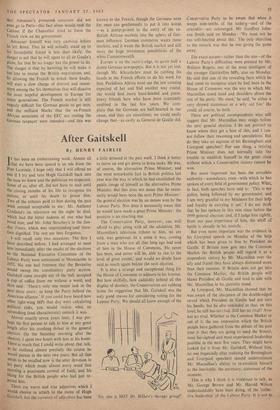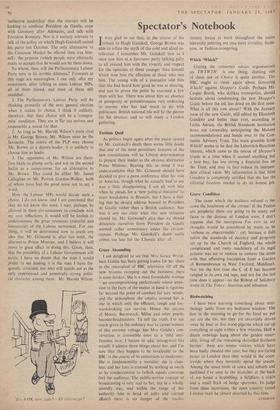After Gaitskell
By HENRY FAIRLIE
II has been an embarrassing week. Almost all that we have been spared is an ode from the Poet Laureate. I hope only that 1 will offend no one if I try and turn Hugh Gaitskell back into the man we knew and the politician we respected. Some of us, after all, did not have to wait until the closing months of his life to recognise his stature, or until his death to praise him. Two of the tributes paid to him during the past Week seemed acceptable to me: Mr. Anthony Crosland's on television on the night he died, which had the bitter sadness of one who had loved him; and Mr. John Strachey's in the Sun- day Times, which was unpretending and there- fore dignified. The rest are best forgotten.
1 will recall only two occasions. The first I have described before. I had arranged to meet him immediately after the results of the elections to the National Executive Committee of the Labour Party were announced at Morecambe in 1952. No one had foreseen that the Bevanites would sweep the constituency party section. Gaitskell came straight out of the hall, accepted a cup of coffee from me without a word, and then said : 'There's only one major task in the 'text three years: to keep the Party behind the American alliance.' If you could have heard how other right-wing MPs that day were calculating Political risks, you would realise what an astonishing (and characteristic) remark it was.
Almost exactly seven years later, I was per- haps the first person to talk to him at any great length after his crushing defeat in the general election On the Saturday morning after the election, I spent two hours with him at his home. There is much that 1 could write about that talk, as he outlined almost precisely the course he would pursue in the next two years. But all that needs to be recalled now is the utter devotion to his party which made almost every word that Morning a passionate avowal of faith; and his liking for the British people who had just re- jected him.
There are warm and true adjectives which I would choose to attach to the name of Hugh Gaitskell, but the currency of adjectives has been
a little debased in the past week. I think it better to move on and get down to brass tacks. He was, of course, the alternative Prime Minister; and the most remarkable fact in British politics last year was the way in which he had established the public image of himself as the alternative Prime Minister. But this does not mean that he neces- sarily would have been the next Prime Minister: the general election was by no means won by the Labour Party. Nor does it necessarily mean that he would have made a great Prime Minister: the position is an exacting one.
The Conservative Party, however, can well afford to play along with all the adulation. Mr. Macmillan's television tribute to him, we are told, was generous. In a sense it was, coming from a man who not all that long ago had said of him in the House of Commons, 'He never has been, and never will be, able to rise to the level of great events,' and would no doubt have said as much again before the next election.
It is also a strange and exceptional thing for the House of Commons to adjourn in his honour. But how skilfully, how caddishly behind all this display of decency, the Conservatives are rubbing home the suggestion that Mr. Gaitskell was the only good reason for considering voting for the Labour Party. We should all know enough of the 'No, this is NOT Dr. Hilbert's therapy group!'
Conservative Party to be aware that when it weeps nine-tenths of the iceberg—and of the crocodile—are submerged. Mr. Geoffrey John- son Smith said on Monday: 'We must not be too soft-hearted about this.' The only objection to the remark was that he was giving the game away.
The exact nature—rather than the size—of the Labour Party's difficulties were pointed by Mr.
William Rogers, one of the most intelligent of the younger Gaitskellite MPs, also on Monday. He said that one of the revealing facts which he had come to recognise since he had been in the
House of Commons was the way in which Mr. Macmillan stood head and shoulders above the rest of his party. 'He must,' he said, 'be either a very shrewd statesman or a wily old fox.' He could, of course, be both.
There arc political correspondents who still suggest that Mr. Macmillan may resign before the next general election. I do not pretend to know where they get a hint of this; and I can- not follow their reasoning and speculations. But do they take no account of his Birmingham and Liverpool speeches? For one thing, a retiring Prime Minister does not normally take the
trouble to establish himself in the great cities without which a Conservative victory cannot be won.
But more important has been the complete authority—ascendancy, even—with which he has spoken of every field of government policy. What,
in fact, both speeches have said is: 'This is my policy, being followed by my government, and I am very grateful to my Ministers for their help and loyalty in carrying it out.' I do not think that he has spoken in this vein since before the
1959 general election; and, if I judge him rightly, from our past experience of him, the whiff of battle is already in his nostrils.
But even more important was the evidence in. his Liverpool speech on Monday of the help
which has been given to him by President de Gaulle. If Britain now gets into the Common Market the British people will regard it as a stupendous victory by Mr. Macmillan over the ally and friend they have always distrusted more than their enemies. If Britain does not get into the Common Market, the British people will blame President de Gaulle and tend to side with Mr. Macmillan in his patriotic stand.
At Liverpool, Mr. Macmillan showed that he was aware of the sharpness of the double-edged sword which President de Gaulle had put into his hands; but he alno reminded us that, on this level, he still has no t ival. Still has no rival? Now has no rival. Whether in the Common Market or out of it, the one impression which the British people have gathered from the debate of the past year is that they are going to need the firmest, most far-sighted and most experienced leadership possible in the next five years. They might have looked for it from Mr. Gaitskell. Without him, no one (especially after studying the Birmingham and Liverpool speeches) should underestimate Mr. Macmillan's ability to re-establish himself as the inevitable, the necessary, statesman of the moment.
This is why I think it is irrelevant to talk, as Mr. George Brown and Mr. Harold Wilson
understandably have been doing, of the 'collec- tive leadership' of the Labour Party. It is not to 'collective leadership' that the electors will be looking to confront President de Gaulle, cope with Germany after Adenauer, and talk with President Kennedy. Nor is it entirely relevant to talk of the policy on which Hugh Gaitskell united his party last October. The only alternative to the Common Market he offered then was him- self: the promise (which people were obviously ready to accept) that he would not let them down.
To whom, then, will the Parliamentary Labour Party turn in its terrible dilemma? Forecasts at this stage are meaningless. I can only offer my assessment, after talking to some Labour MPs, all of them biased, and most of them still muddled: I. The Parliamentary Labour Party will be thinking primarily of the next general election when it makes its choice. I think it unlikely, therefore, that their choice will be a 'compro- mise' candidate. They are in Tar too serious and responsible a mood for that.
2. As long as Mr. Harold Wilson's main rival is Mr. George Brown, Mr. Wilson must be the favourite. The centre of the PLP may choose Mr. Brown as a deputy-leader; it is unlikely to choose him as leader.
3. The opponents of Mr. Wilson are there- fore likely to plump early, and not on the second ballot as a compromise, for an alternative to . Mr. Brown. This could be either Mr. James Callaghan or Mr. Patrick Gordon-Walker, both of whom have had the good sense not to say a %Nord.
How the Labour MPs would decide such a choice, I do not know. and I am convinced that they do not know this week. I may, perhaps, be allowed in these circumstances to conclude with my ow n reflections. It would still be foolish to underestimate the great resources (material and immaterial) of the Labour movement. For one thing, it will be determined now to crush any idea that Mr. Grimond is, after last week, the alternative Prime Minister, and I believe it will move to great effect in doing this. Given, then, that the possibility of a Labour Government still exists, I have no doubt that the man I would prefer to see leading it is the man I have fre- quently criticised, but who still stands out as the only experienced and potentially strong politi- cal character among them Mr. Harold Wilson.
'ft's A-OK noir. /tidy go!'



































 Previous page
Previous page